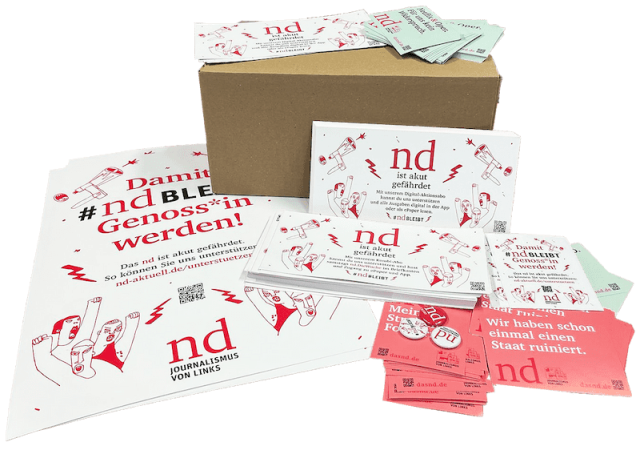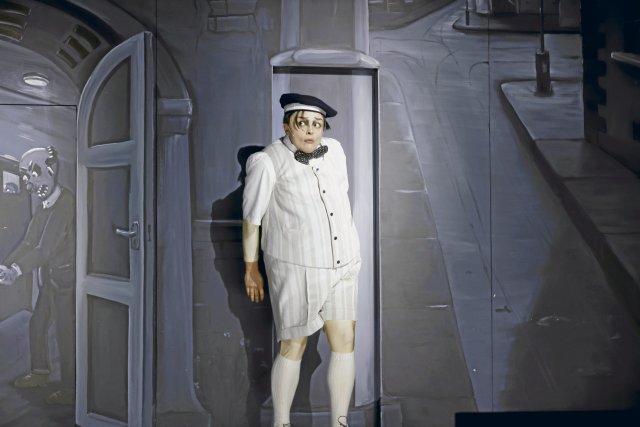Like a morbid Prussian comic: Via Jikeli plays the “subject” Diederich Heßling.
Photo: Ute Langkafel/MAIFOTO
The director Christian Weise is not a man for subtle messages. While many of his colleagues see their task as transferring a canonical text into the present and confronting it with the contradictions of our present, the trained puppeteer happily overshoots the mark. Weise has already had William Tell set in a carp pond and Shakespeare in the Star Wars cosmos.
The sometimes somewhat strenuous originality of his productions is striking in an industry that has become a bit frightened by its own imagination in recent years and which therefore often prefers to convey messages rather than let the play run wild. Weise still fits into the program of the politically extremely ambitious Maxim Gorki Theater, as under Shermin Langhoff’s direction they focus on the reconciliation of E and U and on laughter as a lubricant of knowledge.
Weise now adapts “The Subject” by Heinrich Mann. The satire, first published as a serial novel in 1914, tells the life story of the chemist and paper manufacturer Diederich Heßling, who achieved political and social advancement at the time of Wilhelm II. The motto “Hump up and step down” is groundbreaking for him. He admires the emperor, but is above all an opportunist who has no problem making pacts with the Social Democrats if it benefits him. The subtitle of the manuscript was originally “History of the Public Soul under William II.”, so an entire society was intended to be portrayed here. Kurt Tucholsky enthusiastically described the book as “the German man’s herbarium.”
Weise takes up this idea by condensing the world described even further. He lets the story be performed with borrowings from banquet singing. At the beginning, Till Wonka even sings the Mackie Messer song from the “Threepenny Opera,” with the lyrics rewritten in a somewhat clumsy manner. There is a lot of music anyway, Jens Dohle and Falk Effenberger sit left and right of the stage on the keyboard and drums.
The visual artist Julia Oschatz has set up her stage between them. Large-format drawings in gray tones show scenes and rooms from the novel: a courtroom, the paper factory or the bar where Heßling drinks with his comrades from his student association. The figures in the pictures are distorted into caricatures; it looks as if Otto Dix had delivered a graphic novel. There are flaps attached to their heads; the actors can open them and insert their faces into the picture, as is the case with displays at tourist attractions. Props such as beer mugs or a syringe and even an entire coffee table to strap on are also made of cardboard. The message is clear: everything here is just a facade.
In his version of the play, Weise also focuses more on the theater theme dealt with in the novel. The actor is declared to be a significant figure of the Wilhelmine present. In this sense, however, he should not be understood as an artist, but rather as a master of disguise, as someone who can play the game of others around him so well that at some point he is allowed to determine the rules himself.
The ensemble, equipped with fat suits, glued-on buck teeth, fake mustaches and monstrous shoulder pads, fits well into this expressionistic setting. It tells the story with speed, lots of humor and slapstick interludes. Heßling himself, based in Berlin, is portrayed by Via Jikeli, who has just finished her studies at the Ernst Busch Academy of Drama and is now making a big appearance. She stomps and rumbles across the stage, roars and whimpers, grimaces, opens her eyes grotesquely wide and demonstrates an impressive sense of timing in all of this.
You can also enjoy watching the other players Marta Kizyma, Catherine Stoyan, Tim Freudensprung and Till Wonka for a while, but then a dramaturgical problem arises. The material moves further and further away due to the exaggeration and soon completely loses its connection to the present. Mann’s satirical means tried to work out a truth, Weise now focuses on it again using the means of banquet singing. But together the result seems completely artificial. As if the content of the text wasn’t that important, as if the theater simply wanted to proudly present its instruments here.
There would be nothing wrong with that, nobody is obliged to do political theater. It would be perfectly fine to simply want to entertain. But that doesn’t work, because the resources that Weise uses here are ultimately limited. The sophisticated stage design, the flashy costumes, the blasts on stage – all of this is captured, recognized and admired exhaustively after three quarters of an hour. But the evening is twice as long. To save the second half, it would either need more spectacle or a little more depth.
Instead, Weise opts for a few ironic allusions to the theater. And then tries to politicize his production afterwards. Almost at the end, Heinrich Mann himself has his say; in a speech in the early 1920s he worried about the stability of Weimar democracy. This is followed by a request to the audience not to let characters like the main character take control. “The Subject” is actually interpreted here as a novel about the rise of National Socialism. And the main character is the kind of person you have to be careful of even today.
Well, but where can the Heßlings currently be discovered? One should probably recognize the traits of an AfD actor in him. But where are the similarities to the Höckes, the Weidels or Chrupallas? You don’t recognize them, perhaps because everything here is so brightly made up and acted that all reality flees the stage.
Next performances: December 30th, January 25th
#ndstays – Get active and order a promotional package

Regardless of whether it is pubs, cafés, festivals or other meeting places – we want to become more visible and reach everyone who values independent journalism with an attitude. We have put together a campaign package with stickers, flyers, posters and buttons that you can use to get active and support your newspaper.
To the promotional package
judi bola judi bola sbobet link sbobet
